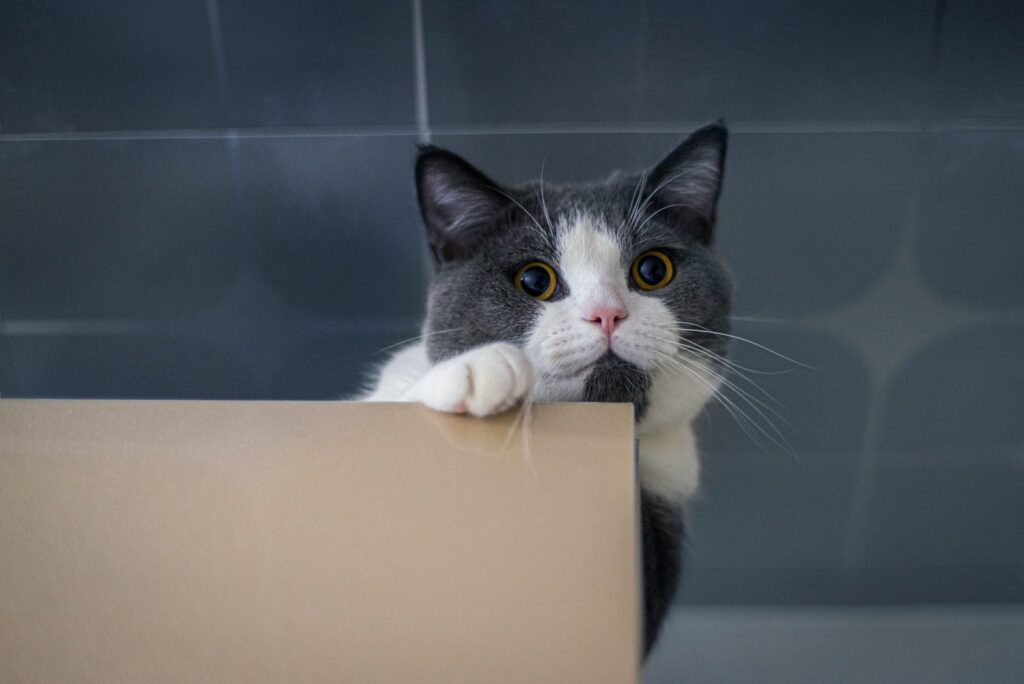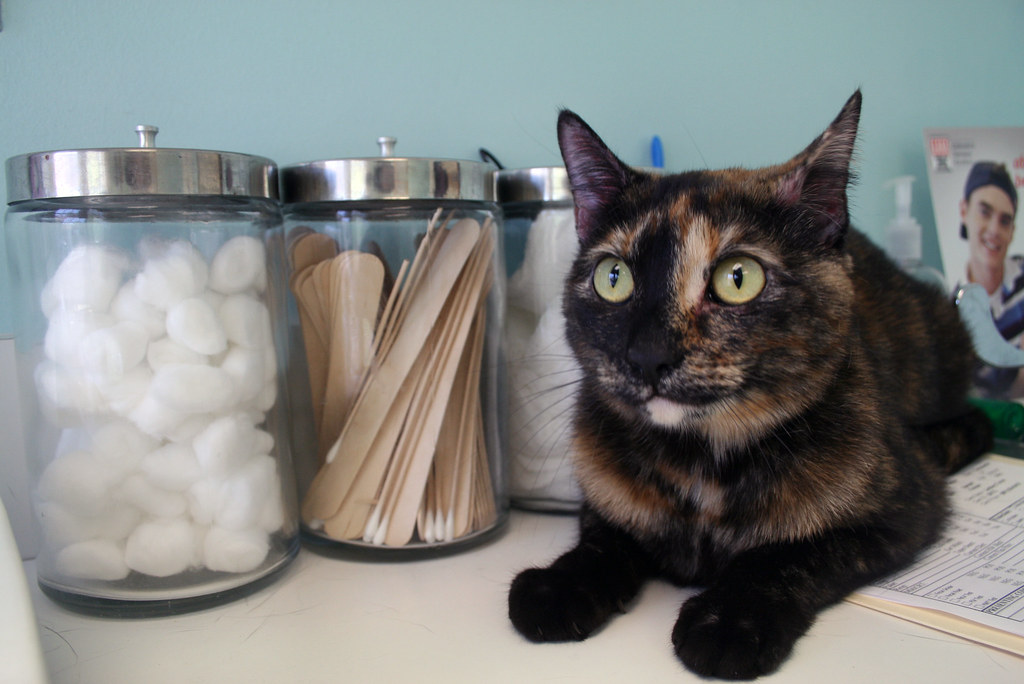Overview
Cats are often seen as independent pets, but they can be quite sensitive to environmental changes. Loud noises, new people, or even a routine disruption can stress some cats.
As a cat owner, it’s important to understand the common causes of feline stress and learn how to calm your stressed cat. This article will provide tips and techniques for soothing your anxious kitty to help them feel secure and comfortable again.
4 Main Causes of Cat Stress

What tends to stress out cats the most? Have you ever wondered why your affectionate cat suddenly seems on edge, displaying signs of stress that leave you concerned?
Here are 4 of the most common reasons that is making your cat stressed:
1) Loud noises

Thunderstorms, fireworks, or loud music can frighten cats due to their sensitive hearing. Vacuums and other loud appliances also frequently startle them.
A stressed cat often reacts sensitively to loud noises, as their acute hearing magnifies the impact. Sudden bursts of noise, like thunderstorms or construction sounds, trigger the cat’s response.
These auditory disruptions disrupt their sense of security, leading to heightened anxiety and stress. The resulting unease may manifest in behaviors such as hiding, excessive grooming, or even aggression.
2) Visitors

Stressed cats often find the presence of visitors disruptive, introducing unfamiliar scents, sounds, and faces into their territory. The intrusion can trigger anxiety, prompting a cat to seek refuge or display defensive behaviors.
Even well-intentioned guests may unknowingly contribute to the stress, unsettling the feline’s routine and challenging their sense of security.
Related: 6 Holiday Safety Tips For Cat Owners
3) Environment changes

Changing households, furniture arrangements, their food, and more can be extremely disorienting and distressing.
A stressed cat is particularly sensitive to changes in its environment. Alterations to the layout of their living space, introduction of new furniture, or even rearrangement of familiar objects can disrupt their sense of comfort and security.
Cats thrive on familiarity, and any modification to their territory may induce stress. To them, these alterations are not merely cosmetic but can be perceived as potential threats, prompting defensive behaviors or withdrawal.
Understanding and managing these environmental changes is essential to ensuring a harmonious living space for our feline companions and minimizing the impact of stress on their well-being.
4) Illness

Underlying medical issues like infections, dental problems, arthritis and more can cause significant pain and discomfort that shows up as aggression or other behavioral issues.
When a cat is unwell, stress becomes an unwelcome companion. Illness, whether acute or chronic, introduces physical discomfort and disrupts their overall well-being.
A stressed cat may exhibit subtle changes in behavior, such as lethargy, changes in appetite, or withdrawal. The distress is not only a response to physical pain but also an instinctive survival mechanism, as illness compromises their ability to fend for themselves in the wild.
Recognizing signs of stress due to illness is crucial for timely veterinary intervention, ensuring the cat’s health is restored and the source of stress alleviated.
Related: Do Cats Sleep More In The Winter? Discover 4 Reasons Why
How to Calm Your Stressed Cat: 4 Techniques and Tips

Signs of a stressed cat will include:
- Hiding
- Aggression
- Restlessness
- Unusual vocalizations
Here are some tips for helping to soothe them:
1. Create a Safe Space
Provide your cat with a dedicated “safe space” they can retreat to when frightened. This should be a semi-enclosed area like a corner of a room, a spare bathroom, or under some furniture where they can hide. Place familiar blankets and toys inside to further comfort them.
2. Play Calming Music
Try putting on classical, nature sounds or special “music for cats” tracks formulated to relax them. This can help muffle frightening sounds and support a more zen environment.
3. Limit Stress Triggers
If your cat has a major stress trigger like vacuuming, thunderstorms, or a certain visitor, limit exposures whenever possible. Avoid triggering them unnecessarily while applying other calming techniques.
Related: Do Cats Cry?
4. Offer Interactive Toys and Treat Puzzles
Distract them with wand toys, laser pointers, treat balls and other engaging playthings. Puzzle feeders that hide or dispense food can redirect their focus while helping them relax.
You can buy puzzle feeders on Amazon for less than $20.
Stressed Cat: When to Call the Vet
While most stress cases can be managed with tender loving care at home, seek medical guidance if your cat displays these red flags:
- Loss of appetite or extreme lethargy
- Excessive vomiting or diarrhea
- Aggressive behavior like biting or unprovoked attacks
- Compulsive habits like over-grooming
- Inappropriate elimination outside the litter box
Conclusion
A stressed cat can be uncomfortable for both pet and owner. Understanding common stress triggers allows anticipation and mitigation of issues whenever possible.
Have you had success calming your own worried cat? What are your go-to tricks for soothing a stressed out kitty?
Let me know in the comments below! And don’t forget to share this article if you found it helpful.
Frequently Asked Questions
How do you comfort a scared cat?
When comforting a scared cat, it’s important not to overwhelm them. Give them a safe space to hide like under a bed or in a carrier with familiar bedding.
Speak softly, avoid direct eye contact, and sit calmly so they can approach when ready. You can try interacting with toys or treats at a slight distance.
Cats also release comforting pheromones when you slowly blink your eyes at them. Meeting them on their level builds trust.
Be patient – it can take frightened cats quite awhile to relax and demonstrate they feel safe again through normal, settled behaviors like grooming, sleeping or playing.
What home remedy is good for stressed cats?
Several home remedies can relieve stressed cats, like playing relaxing music to help cancel out frightening sounds.
Providing fresh catnip often has a mellowing effect. Letting them retreat to a quiet, enclosed safe space with familiar items is also effective.
Interactive play and food puzzles also redirect their focus from whatever is causing stress.
How long does it take for a cat to calm down?
Every cat responds differently based on their personality and the type of stressor, but typically, observable signs of feeling threatened like hiding, agitation or vocalizing may last from 10 minutes up to a few hours from the upsetting trigger.
Cats stressed by loud noises or quick environmental changes often relax shortly afterwards. More shy cats or those dealing with major lifestyle disruptions may take a few days or longer to exhibit normal unstressed behavior patterns again.
It’s important to give cats adequate alone time in their safe place as needed amid stressful scenarios.

Leave a Reply